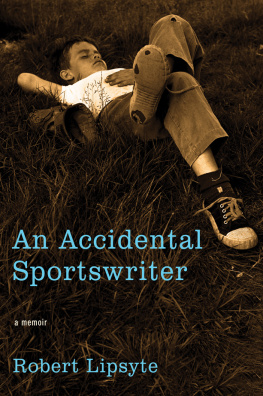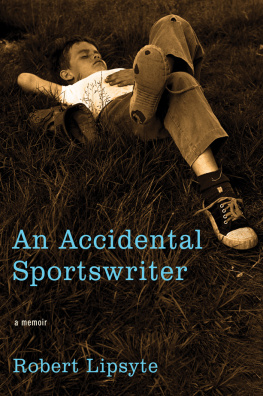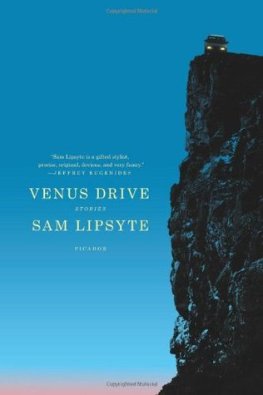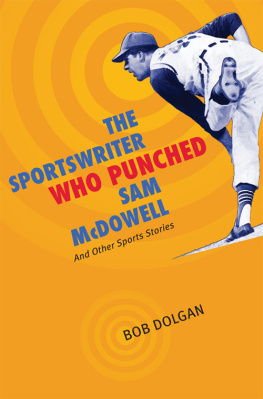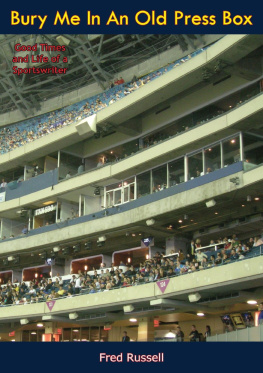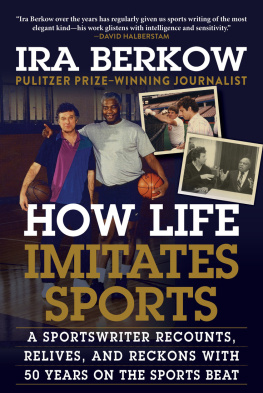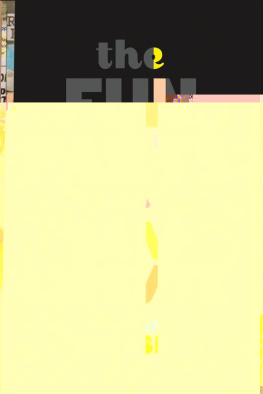An Accidental Sportswriter
a memoir
ROBERT LIPSYTE

For Lois, my format
The ball I threw while playing in the park
Has not yet reached the ground.
Dylan Thomas, Should Lanterns Shine
Contents
I lined up a summer job in 1957 as helper on a city water truck that would cruise Manhattan filling troughs for the dwindling number of working horses in the city. I had just graduated from Columbia and was headed to Claremont College in California, which was as far from the borough of Queens as I could imagine myself. I had sent a dorm deposit. Once out there, I would fulfill my destiny as a novelist, either starving on the beach because my fiction was too avant-garde or luxuriating by the side of my pool because I had sold out. Both scenarios involved dangerous women. I was an English major.
But I needed a summer job to raise cash for the trip. When the water truck job fell throughit was canceled, I think, for lack of fundingI bought my first copy of The New York Times . Id heard the paper had good classified ads and quickly found one for editorial assistant at the Times itself.
The personnel people at the Times were pleasant enough when I showed up at West Forty-third Street that June morning, but patronizing. These jobs are extremely coveted, they said, because you assist New York Times reporters and editors . You get to share their air. It sounded as though I were applying to be a squire for King Arthurs Knights of the Round Table. One of my interviewers waved toward the invisible line of Rhodes Scholars, Fulbright Scholars, and Ph.D. candidates waiting for a job and implied that my B.A. was a dime a dozen. But my last interviewer suggested I fill out an application anyway. Who knows? Something might come up in a few months. I almost didnt bother since I would be going west in a few months. But I was a polite boy then, and I filled it out.
I went a block south to seedy old Forty-second Street and saw a cowboy double-feature. I loved Westerns. When I was a kid, my dad and I went to a shoot-em-up every Tuesday night in the summertime, and the Lone Ranger has been a role model of mine since childhood. He protected weaker people by beating up bullies without becoming a bully himself. (I still love Westerns. In some ways, I think, sports have replaced Westerns and jocks have replaced gunslingers in our national imagination, not necessarily to our advantage.)
After the movies, I took the subway to Rego Park. I had moved back home after graduation. My mother looked up from the stove to say, You got a crank call, Bobby. A man said if you show up tomorrow and pass a physical, you can start work immediately at The New York Times .
The physical consisted of showing up.
That editorial assistant job was copyboy in the sports department. It seemed like an odd place for me, and I wondered if I could handle it. I didnt know much about sports. A fat boy growing up, I didnt even start playing sports seriously until I was in my teens. My dad was no fan; we never talked sports at home. I was, at best, a casual fan, enough to understand what my friends were talking about. (I actually didnt become a fan until I left daily sportswriting for the first time in 1971 and could watch a game without having to think about covering it.) And not only had I never read the Times sports pages, I had barely read the Times at all. (My parents, being public school teachers, got the New York World-Telegram & Sun , which had an education page.) But I needed a job.
My shift was 7 P.M. to 3 A.M. My nights off were Tuesday and Wednesday. My first night on the job, I almost stopped the presses.
The copyboy who broke me in was in a hurry to get out for a long dinner break at Goughs, the bar across the street, to talk sports with the printers and pressmen. What he was supposed to train me to do was simple enough: hover near the copydeskactually a dozen dirty blond cigarette-charred wooden desks lined up so the cranky old bullies could face each other and chuckle as they butchered reporters storiesuntil one of them yelled Boy! This could be a call to get coffee, sharpen pencils, refill pots of library paste, or, most important, snatch a page of edited copy, roll it up, snap on a rubber band, and slip it into a plastic-and-leather canister that would be launched like a mortar round up a metal pipe in the pneumatic system to the fourth floor, where it would pop out of the pipe and thump into a rubber well. Someone would unsnap the leather strap of the canister, pluck out the copy, and hand it to a Linotype operator, who would turn it into lines of hot metal type to be fitted into the frames of printing press pages on huge stone tables.
Whether it was a failure of communication in the five-minute training session or, more likely, one of my enduring techno screw-ups, I skipped the stage in which I was supposed to slip the copy into the canister. I slipped the rolled-up paper directly into the sucking mouth of the pneumatic pipe. There was a whoosh, and the lid of the pipe snapped shut.
After a while, the sports makeup man on the fourth floor began phoning down: Wheres the fucking copy? The head of the sports copydesk screamed back, Look up your ass! This was common, but the long absence of copy was not. As deadline approached, someone thought to check the system, actually put an arm up the pipe. It was lined with paper. Most of that nights sports report was stuck in transit.
Had it happened a few minutes later, they might have had to stop the presses or release part of the first edition with no sports section. Small loss, I say in retrospect, but unthinkable then (not unthinkable now, of course, when the Times apparently has toyed with the idea of further downsizing the sports report, even dropping the section entirely, as did the Washington Times , to save money). With the exception of Gay Taleses pieces, the Times sports section in 1957 was at best mediocre, perhaps by design. The editorial side of the Times seemed faintly embarrassed by sports, although Business appreciated the car and boat ads it anchored, and everybody enjoyed the free tickets that flowed in. A survey later revealed that Times readers interested in sports took a second paper, usually the New York Post or the Daily News , to satisfy their jock jones.
But on my first night, the pipes were jammed with the faux Homeric mythmaking of rosy-fingered Arthur Daley, the Sports of the Times columnist; the plodding game detail of the ambassadors to baseball, John Drebinger, Roscoe McGowen, and Louis Effrat; John Rendels yacht-racing stories with their long tails of agate-type results; and the symphonic tennis summaries of the courtly Allison Danzig. All were respected students of their games, all were determinedly dulled down in the style of the Times . Years later, writing feature sidebars to Danzigs coverage, I was impressed (and, yes, proud) at how tennis stars lined up at the press table after their matches to respectfully ask what Mister Danzig had observed and how well or poorly they had played.
But that first night at the Times , I was made to feel as though I had almost let the only illuminated pages of Genesis slip out of my hands into a fire.
The pneumatic system was shut down until the pages, some still rolled, tumbled and fluttered back into the sports department. I stood there dumbly as the deskmen glanced at me, rolled their eyes, and shook their heads. Smirking, one of them, with exaggerated movements, filled the canisters and fired them upstairs. They chuckled, then asked me if I understood what I had done, how close we had come.
I felt like crying, but didnt know how anymore. I was nineteen. Should I walk out into the night right now or wait to quit until the other copyboy returned?
Next page
